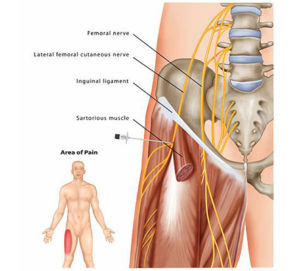 Peripheral nerve blocks are generally done to control pain arising from a nerve, also known as neuralgia. Nerve injury can be caused by trauma, compression, ischemia, or toxic exposure to a nerve.
Peripheral nerve blocks are generally done to control pain arising from a nerve, also known as neuralgia. Nerve injury can be caused by trauma, compression, ischemia, or toxic exposure to a nerve.
In general, a combination of cortisone and long-acting local anesthetic is injected in proximity to the injured nerve in order to provide pain relief and reduce nerve irritation. These procedures are usually done at bedside and take only a few minutes.
Commonly performed peripheral nerve blocks include:
- Median nerve blocks for carpal tunnel syndrome.
- Ilioinguinal nerve blocks for groin pain after hernia surgery, or due to compression from tight fitting belts, or trauma.
- Neuroma injections for Morton’s neuroma, or neuroma formation after surgical injury to a nerve (Neuroma is a benign growth on nerve endings that spontaneously transmit pain signals).
- Sciatic or femoral nerve blocks for leg or knee pain.


